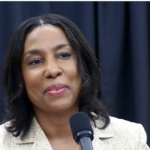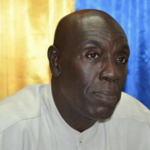Minister of Foreign Affairs and Foreign Trade Kerrie Symmonds has reiterated his call for increased private sector investment in global resilience initiatives, with a particular focus on developing nations.
Speaking at the Caribbean climate resilience event at the Hilton Resort, Symmonds emphasised that traditional funding sources, including state partnerships and conventional financiers, were no longer sufficient to meet the substantial financial requirements for building resilience, especially for small island developing states (SIDS) such as Barbados.
The minister singled out the oil and gas industry as a prime example of a sector that has reaped significant profits in recent years, yet has not consistently contributed to global resilience efforts. He pointed to the £130 billion profit made by Saudi oil giant Aramco in 2022, arguing that even a small percentage of these earnings could make a considerable impact.
“Don’t tell me that we can’t be asking oil and gas companies to leave one percent of their profit in the interest of humanity,” Symmonds stated, noting that such a contribution from Aramco alone would amount to $1.6 billion.
The minister also turned his attention to the air travel industry, valued at $3.5 trillion annually. He suggested that requesting this sector to contribute one per cent of its value towards resilience initiatives is a modest proposal, given the scale of its earnings and its impact on global climate and sustainability.
Symmonds made a similar call last month when he highlighted the disparity between the “obscene profits” made by oil, gas, and shipping companies and their slow progress towards transitioning to greener practices.
“There is a community of people who make obscene profits in the business of oil and gas. There is a community of people who make obscene profits in the business of shipping, maritime transport, but when we look at the maritime transport and the speed with which it is transforming itself into a green and energy-efficient sector, we realise that they are lagging far behind,” he told his parliamentary colleagues on July 9 during debate on the Marine Transport Emissions Control Bill.
His latest appeal focused on partnership and shared responsibility, stressing that while some nations bear the brunt of global challenges, the responsibility for addressing these issues should be shared by all.
“We’re all in this together,” he remarked, calling for a pragmatic and collaborative approach to securing the necessary funds to protect vulnerable communities worldwide.
The call for private sector contributions is part of a broader strategy by the Barbados government to explore innovative financing models to help bridge the funding gap for resilience-building efforts.
(LG)
The post ‘Big oil must pay for climate resilience’ appeared first on Barbados Today.


